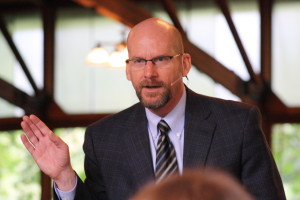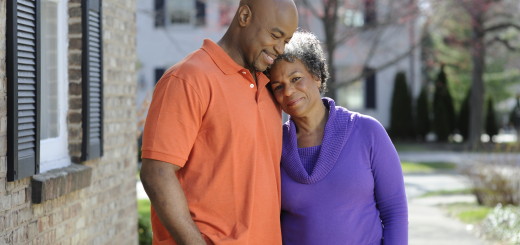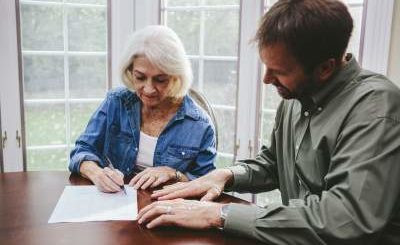The Santa Cruz Education Conference is underway! Caregivers: drop your preconceived notions about caregiving
Bill Fisher, chief executive officer of the Alzheimer’s Association, Northern California and Northern Nevada Chapter kicked off the annual education conference in the Santa Cruz area at the Mount Hermon Conference Center on a very personal note.
“My father died at age 90 about three weeks ago,” he said. “He was a cancer survivor, he had congestive heart failure and he had Alzheimer’s disease, and I can tell you that for my mother that it was the dementia that made it really hard for her as a caregiver.”
He reviewed the mission of the Alzheimer’s Association and introduced the day’s first keynote speaker, David Coon, Ph.D., associate vice provost for Health Outcomes at Arizona State University, senior associate dean, professor, who spoke about caregiving across the course of dementia.
He started his presentation by asking the audience to drop their preconceived notions about caregiving. “There are four types of people: those who have been caregivers, those who are caregivers, those who will be caregivers and those who will need caregivers.”
He reviewed statistics that show caregivers are at increased risk of depression, extreme fatigue, stress, anger, anxiety, financial loss and social isolation. Caregiver stress is generally caused by four things: 1.) Lack of control and predictability 2.) Loss of outlets for frustration or sources of support 3.) Perception that things are getting worse 4.) Feelings of not having what it takes to meet the next obstacle (helplessness).
Dr. Coon said he often hears statements from caregivers such as: Dad just does it to get to me; she could do it yesterday; he does it when he wants to.
“I understand where that comes from because we have history with our parents, siblings, etc.,” he said. “But how much does it benefit you to believe that someone with memory problems is strategically doing something to get to you? How helpful is it to hold on to the idea that someone who may be losing their judgment and memory is doing something on purpose?”
He encouraged the audience to change their thinking when they get frustrated with the person they are caring for. He explained the behavior chain: Trigger >> Behavior >> Reaction.
“The only thing you as a caregiver have control over are triggers and reactions. Occasionally, we can’t change the triggers. During those times, changing how you react to the behavior could keep the situation from getting worse.”
He then led the audience through a breathing exercise for stress release called mindful breath:
Step 1: Choose a word that represents relaxation for you.
Step 2: Take four deep breaths and mouth your word as you exhale.
Step 3: Rate your tension before and after this exercise.
Dr. Coon concluded his presentation by advising people to really be aware of who their support system is – who really offers help and support and a positive presence. “Avoid the toxics,” he said. “Taking care of yourself is the best gift you can give to the person you are caring for.”
More helpful resources related to this article
Alzheimer’s behaviors and care
Local education conferences and classes
For more information on how to cope with caregiver stress and to learn more caregiver tips, contact the Alzheimer’s Association at 800.272.3900 or visit www.alz.org.



















Dear Gentleperson:Jean Simmons, who is such a blessing to our fiamly, gave me your website info. I was born and raised in Wildwood, FL and returned in 2006 after spending 40 years in NYC and Chicago to help with my mother after I was able to take an early retirement at age 62. It was not until a year ago or so that I realized that something unusual was going on with my mother. At the end of last year, she was diagnosed with Vascular Dementia. Still, we are greatly blessed. She has her bad days when she wonders what has happened to her husband, or her sister or her mother, but then there are other days when she brings me so much joy. I am her son and she is my mother. From the beginning, we have had a duty to each other. She has done for me everything that a mother is required to do for her son. I am proud that the Creator has placed in my heart the will to fullfill my duty to her. I am grateful that you have the courage and the character to speak the truth regarding the issues that you face. You are a blessing to your mother and you are a blessing to us.Peace and Love.Sam